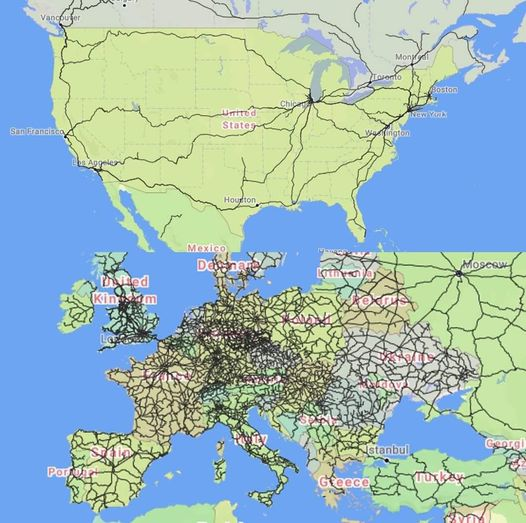Colin Read • Apr 05, 2024
Dark in the Middle of the Day? - April 7, 2024

Many states in the U.S. and some provinces in Canada and Mexico will experience a once-in-a-lifetime event on Monday. A given location in the United States will see a total lunar eclipse of the Sun just once in about 350 years. Those lucky enough to be in the path of totality will see the Sun completely disappear for between a moment and four minutes at various times from early to mid Monday afternoon. Unfortunately, the latest forecast has about 80% of the path obscured by cloud, with the notably exception Vermont, Maine, and my corner of New York.
Where I live, and you are invited to join me, the Sun will be totally obscured for about three and a half minutes. Our home is about three miles from the totality centerline. I’m thrilled, especially since the weather prognosis is sunny and 56 degrees here Monday afternoon, but Natalie observes that it gets dark for much longer every night. She does not quite share my enthusiasm.
It got me to thinking - what is the economic value of enthusiasm? Can we place a value on something as ethereal as an eclipse?
First, this is no ordinary eclipse. The moon has to be in just the right position to cause a total eclipse. The moon’s orbit is not round. Its elliptical path takes it farther away from the Earth at times, which permits the moon to block more of the Sun. The moon just happens to be the right size. If it were a bit smaller, or when it blocks the Sun from a position closer to Earth, we see only an annular eclipse, with the Sun poking out beyond the edges of the moon, even at peak obscuration. Only when the moon of sufficient size and distance from the Earth aligns between the Earth and the Sun do we experience the full obscuration that happens once in a lifetime or less.
But, don’t listen to me. My excitement is only anecdotal. Can we quantify objective economic benefits arising from an eclipse?
People experience joy and wonder for many reasons, but none of us can place a price on them. We can provide a lower bound, though.
We know that people are willing to spend significant sums to see the eclipse. The media warns us of traffic jams in Plattsburgh, a place where I would normally never have to wait for more than one light cycle to cross an intersection. Some estimate that upward of two hundred thousand people could travel to Vermont. That’s big for a state that has a population of less than 650,000 people. That’s for an eclipse that barely skirts Vermont, while it transverses right across the northern half of my state of New York.
Across the country, about 32 million people are directly in the path of totality. That’s a lot. More than one in ten do not have to travel far, if at all, to view a once-in-a-lifetime event.
People have does market surveys and discovered that those less fortunate than me will spend approximately $2 billion to travel, rent hotel rooms, buy eclipse glasses and souvenirs, and eat at restaurants, all to see a fleeting three minutes of darkness. This first round of expenditures induces second and additional rounds of spending as money is put in the pockets of travel industry enterprises, their employees, and their suppliers. When we include these incomes, and the jobs they support, total expenditures approach $6 billion.
Of course, the twelve million people estimated to travel in the U.S. to see the eclipse is dwarfed by the 32 million who have to pay nothing at all. We get the benefits without paying the costs. If we have the same excitement as those traveling to see the eclipse, our valuation would almost triple the lower bound of enjoyment as measured by what many would spend to see the event.
Of course, only about one in twenty five in this country are planning to go to such great lengths, so perhaps only a fraction who enjoy it from our front yards have a similar valuation. I’m almost certain everybody will derive some enjoyment. I have a cynic friend who claims he may not even leave his office at the designated time, but I bet he will.
Based on these observations, it seems clear that our willingness to spend time and money to see the eclipse is bound from below by the $10 billion ballpark estimate of either what we are willing to pay or what we may pay for something that falls into our lap.
The actual value is surely far higher. I have paid far more for fleeting once-in-a-lifetime experiences. If asked what I might be willing to pay to see an eclipse such as the one on Monday, I’d probably value it at more than $1000. If I am at all representative of the general population (while most people tell me I’m not), that collective valuation for the U.S. would be more than $300 billion.
Of course, on March 7, 1970, the Sun and Moon danced in a similar path to what we see Monday. In that eclipse, Carly Simon tells us in her song “You’re So Vain'' that the lover who jilted her “flew your Learjet up to Nova Scotia to see the total eclipse of the sun.” He was clearly willing to pay tens of thousands to see the eclipse. Lear Jet travel is not cheap.
We can use economic tools to attach the lower bound to values of the human experience. Oscar Wilde once said “"A fool is someone who knows the price of everything and the value of nothing". Many claim he was talking about economists. We may not know the value of a human experience, we can say that it is at least as high as the trouble and expense we invest in them.









